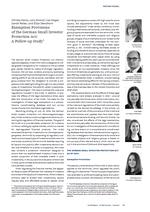Welcome.
I am a Postdoctoral Researcher at the ZEW – Leibniz Centre for European Economic Research in Mannheim. I also co-coordinate the Mannheim Centre for Competition and Innovation (MaCCI).
I am an applied microeconomist. My research interests lie at the intersection of behavioral economics and industrial organization, with a focus on the economic implications of digital transformation. Methodologically, I work with observational data and conduct surveys and experiments.
Working Paper
Skills, job application strategies, and the gender wage gap: Evidence from online freelancing
This paper examines how worker skills and job application behavior contribute to the gender wage gap on a major online freelancing platform. We observe significant occupational sorting by gender, with women over-represented in lower-paying project categories and tending to earn less than men even within the same categories. The unexplained gender wage gap conditional on education is initially 39.9%, but it narrows to under 2% when accounting for differences in human capital and application strategies. Our analysis shows that application behavior, including job preferences and asking wages, is the primary factor, explaining up to 90% of the wage gap. We also find that women work on longer projects and achieve higher application success rates than men, which helps offset lower hourly earnings by accumulating more work hours. While men have slightly greater platform and traditional work experience it has minimal impact on wage outcomes. These findings suggest that the gender wage gap on the platform primarily reflects distinct usage patterns between men and women.
Publications
Contact
- eliza.stenzhorn@zew.de
- L7 1, Mannheim, 68161

